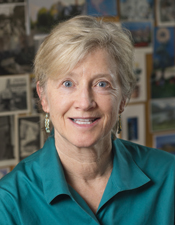Donna Harsch To Head Carnegie Mellon's History Department
By Shilo Rea / 412-268-6094
 Carnegie Mellon University has selected Donna Harsch to head its Department of History, effective July 1. Harsch, a professor of history, succeeds Caroline Acker, who has led the department since 2011 and is retiring from CMU.
Carnegie Mellon University has selected Donna Harsch to head its Department of History, effective July 1. Harsch, a professor of history, succeeds Caroline Acker, who has led the department since 2011 and is retiring from CMU.
The History Department has a strong foundation in research that is relevant to the real world, a hallmark of the humanities at Carnegie Mellon. The faculty's broad-ranging work uses traditional and innovative methods to explore topics from human rights and social injustice to urban, labor and gender histories, and vigorous research practices are incorporated into the curriculum beginning at the undergraduate level. The department, which focuses on specific parts of the world during the 19th and 20th centuries instead of covering all regions and time periods, has a vibrant graduate program with high academic job placement success and a strong anthropology emphasis to complement its cultural history expertise.
"Professor Harsch will be an excellent successor to Caroline Acker, who did a terrific job of quite selflessly leading the department for the last four years of her career at Carnegie Mellon," said Richard Scheines, dean of the Dietrich College of Humanities and Social Sciences. "Donna's work on Germany is first rate, and she has proved to be a versatile and wide-ranging scholar of the 20th century. I am excited to work with her, in particular on a passion of mine that she shares: to feature history prominently in interdisciplinary projects spanning the Dietrich College as well as the rest of Carnegie Mellon."
Harsch, who joined the CMU faculty in 1990, is a political and social historian of modern Germany. Her initial research centered on the rise of the Nazis and then moved into gender relations within East Germany. Currently, she is researching public health issues within the divided East and West Germany. For example, she is looking at the upsurge of infant mortality rates and how the different health systems have responded.
As department head, Harsch hopes to continue the department's focus on social, cultural and policy history, its strongly global scholarly orientation, and its inclusion of interdisciplinary methodologies, especially anthropology. She aims to encourage faculty members to collaborate with others within the Dietrich College — such as in the Departments of Social and Decision Sciences and English — and throughout the university, particularly the Heinz College and Department of Engineering and Public Policy. She also will work to and increase every member of the department's international exposure by supporting their attendance at global conferences and their efforts to work with colleagues from around the world.
"It's an exciting time for the History Department. As we continue to shape our research profile, there is a opportunity to revamp our policy work and bring the department together through shared interests such as social movements, resistance to inequalities and resisting the powers that be," Harsch said.
For more information, visit http://www.history.cmu.edu/faculty/harsch.html.
###